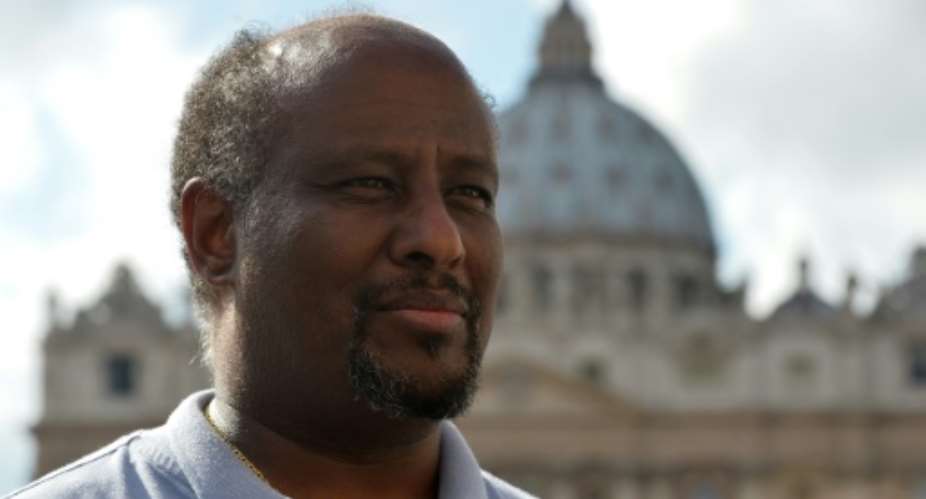Vatican City (AFP) - For years they have been ringing his mobile for help, from the Sinai desert to the Mediterranean. Now this Eritrean priest, himself a former refugee, is a candidate for the Nobel Peace Prize for his work saving migrants.
A small man with greying temples, Mussei Zerai wears a simple metal cross over his light blue t-shirt as he describes his own escape from his homeland and his drive to help others whose lives are in danger.
Founder of the humanitarian organisation "Habeshia" which aids those fleeing war and persecution, Zerai moves between the Vatican and Switzerland, where he offers support to mainly Ethiopian and Eritrean Catholics seeking shelter.
Born in 1955, Zerai left a war-torn Eritrea when he was 14, escaping a dictatorship for Italy, where he hoped to join his father. But by the time he got there, his father had left for Nigeria, meaning the teenager was on his own.
"I was all alone, one of those unaccompanied minors," thousands of whom still arrive each year in Italy, he told AFP.
It was when he met an Italian priest who helped migrants that Zerai realised he still wanted to enter the Church -- a childhood dream which his father had ruled out.
In the year 2000, it became a reality when he entered a seminary at the age of 35.
- Writing on the wall -
It was in 2003 that his name became known among migrants when he served as a translator for an Italian journalist in the jails of Muammar Gadaffi, where Africans hoping to reach Europe were often held captive and abused.
"When they realised that I was interested in them, they wrote my phone number on a wall, with the message 'For any emergency, call this number'," he said.
News of the potential ally spread quickly.
It was in May 2003 that Zerai received his first call from the Mediterranean in the middle of the night in what he initially thought was a joke.
Since then, he has received hundreds of similar calls at every hour of the day, including during mass.
"What with sea sickness and fear of drowning, it takes several minutes to calm people down. They cry out, 'help us!'," he said.
He then tells them how to find the GPS coordinates on the satellite phones they are using, which he passes on to the coast guard.
But it's not always enough.
In March 2011, he alerted the coastguard to a distress call from an inflatable boat with 72 people on board.
But no-one came to their rescue and after drifting for 15 days at sea without food or water, only nine survivors were found.
- A refugee at heart -
Since then, he sends all alerts to the coastguard by email, copying in the "Watch the Med" network to be doubly sure.
Since 2009, the priest has also been working to help free those kidnapped, imprisoned and often tortured in the Sinai desert by bands of traffickers hoping to extort money from their families.
Those unable to stump up the money are helped by his organisation Habeshia, which focuses in particular on freeing young girls singled out to become sex slaves, as well as pregnant women.
Habeshia is also working to save people from kidnappers who have been known to harvest organs from victims who cannot pay.
Meron Estefanos, head of the Eritrean Initiative on Refugee Rights, described Zerai as "a wonderful person".
"He's also a friend, a man admired by everyone," he told AFP.
"He is always available, he fights tirelessly for the refugees. Everyone from the (Eritrean) community (in Switzerland) knows him, he has helped a great number of them," he said.
Despite his status as a man of the cloth, Zerai says he still feels a refugee at heart, a man with no fixed abode in either the Vatican or Switzerland, travelling where he believes Catholic migrants need him.





 Meta releases new version of conversational AI across its platforms
Meta releases new version of conversational AI across its platforms
 Cape Town named Africa’s Best Airport 2024 by Skytrax
Cape Town named Africa’s Best Airport 2024 by Skytrax
 Bono East: Four injured after hearse transporting corpse crashes into a truck
Bono East: Four injured after hearse transporting corpse crashes into a truck
 ‘Be courageous, find your voice to defend our democracy’ — Sam Jonah urges journ...
‘Be courageous, find your voice to defend our democracy’ — Sam Jonah urges journ...
 Exodus of doctors, nurses and teachers have worsened because of unserious Akufo-...
Exodus of doctors, nurses and teachers have worsened because of unserious Akufo-...
 2024 election: Avoid insults, cutting down people in search of power – National ...
2024 election: Avoid insults, cutting down people in search of power – National ...
 ‘You passed through the back door but congratulations’ — Atubiga on Prof Jane Na...
‘You passed through the back door but congratulations’ — Atubiga on Prof Jane Na...
 Government’s $21.1 billion added to the stock of public debt has been spent judi...
Government’s $21.1 billion added to the stock of public debt has been spent judi...
 Akufo-Addo will soon relocate Mahama’s Ridge Hospital to Kumasi for recommission...
Akufo-Addo will soon relocate Mahama’s Ridge Hospital to Kumasi for recommission...
 We must not compromise on our defence of national interest; this is the time to ...
We must not compromise on our defence of national interest; this is the time to ...
